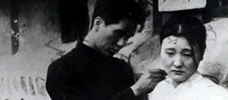Reviews
Tell Me Who You Are
Souleymane Cissé
Mali / France, 2009
Credits
Review by Stephen Snart
Posted on 10 October 2009
Source 35mm print
Categories The 47th New York Film Festival
Malian filmmaker Souleymane Cissé’s reputation precedes him, and for a director that can be both a blessing and a curse. It may help open doors and smooth over the pre-production process but it can also set unrealistic expectation upon the finished product. Cissé returns to the cinema after 14 years with Min Ye (Tell Me Who You Are), his third film to play the New York Film Festival. Best known for 1987’s Brightness (Yeelen) (which a colleague describes as Star Wars in Africa), Cissé has been praised for his social realism and is a pivotal figure in African cinema. Min Ye is the first film of his that I’ve seen, but I don’t need to have seen his others to recognize it as an underwhelming offer, high expectations or not.
What is it about this project that brought Cissé back to filmmaking? It seems to be a desire to expose the hypocrisy around polygamy that continues unabated in modern day Mali. Originally conceived as a television series, Min Ye is a sprawling story of domestic imbalance in Mali’s capital city of Bamako where it is condoned for men to take multiple wives but it is forbidden for women to conduct polygamous relationships too. The lead character is Mimi, a robust, wealthy doctor married to a local filmmaker named Issa. He comes and goes as he pleases, making low-budget films by day and then splitting his free time between Mimi and his younger wife and children. But the moment Mimi starts showing interest in other men - in particular a fishmonger named Abba - Issa gets extremely protective.
A battle of the sexes ensues with shouting matches, legal repercussions and closed-door scheming. The moments of furtive behavior are when the film feels most alive, the prospect of upending the social hierarchy pulsing through the frame. But the film is more concerned with the realism of the situation: the domestic squabbles, the scorn of the community, and the unjust legal system. At times the plot resembles a Shakespearean tragicomedy with its intricacy and clandestine motivations. But it’s not structured anywhere near as artfully as something like The Winter’s Tale or Much Ado About Nothing. It does however share the plethora of relationships and excessive cross-communication of those titles. There isn’t much attempt to properly introduce characters or distinguish supporting roles and I had great difficulty keeping track of everyone, so much so that I stopped trying around the halfway mark.
The film also chooses not to explore the actual logistics of polygamy. There is little sense of how Issa divides his time or his finances. In fact, I’m still unsure just how many wives and children he actually had. But perhaps such vagaries reflect the sad truth of the situation. A double standard is certainly present and the women depicted on screen here are well-educated and hold professional positions of consequence yet are unable to yield much domestic autonomy. Mimi may be queen of the roost when Issa isn’t around, barking orders at the maids without conscience, but she’s still very much at his mercy. And when she tries to match him in a game of fast and loose, she’s met with stern admonition from the community and verbal orders such as “A mature woman keeps her caftan in order.” But that’s not going to stop her from trying.
In the lead role of Mimi, Sokona Gakou (who is also a journalist and TV personality in real life) gives a powerful performance, turning the character into a force with which to be reckoned. Formidable and brazen, she’s like a less vulgar version of Divine (no offense intended). Gakou and Assane Kouyate - who plays Issa - have some very strong scenes together but some of the supporting actors are more relaxed than others. Overall the film maintains a collective sense of naturalism.
Not wry enough to make us laugh ourselves into a state of shocked awareness or straight-faced enough to deliver its message emphatically, Min Ye does not pack as much punch as its subject matter and running time would demand. If the audience reactions at my screening are any indication, foreign audiences will have difficulty connecting with the film. Min Ye is yet to be screened anywhere in its native Africa and according to Cissé during the NYFF Q & A, nothing is scheduled. Much of this has to do with the fact that Mali has only one movie theater in the entire country. Still, he remains hopeful it will eventually see light of day in Africa. Perhaps then, viewed in the context with which it depicts, the real measurement of the film’s efficacy will be taken.
More The 47th New York Film Festival
-

Sweetgrass
2009 -

Kanikosen
2009 -

Police, Adjective
2009 -

Antichrist
2009 -

Wild Grass
2009 -

Lebanon
2009 -

Crossroads of Youth
1934 -

The White Ribbon
2009 -

Mother
2009 -

Min Ye
2009 -

The Art of the Steal
2009 -

In Comparison
2009
We don’t do comments anymore, but you may contact us here or find us on Twitter or Facebook.



